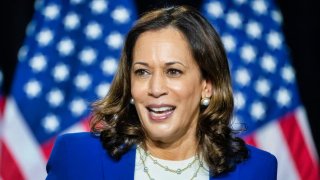Kamala Harris's Real Opportunity for Progress With North Korea
While Harris should not “cozy up” to Kim Jong-un, she will need to negotiate a meaningful deal on North Korea’s denuclearization. A successful policy will require balancing pressure and engagement, ensuring regional security through military and diplomatic means, addressing humanitarian issues, and maintaining strong alliances.
The latest presidential debate between Kamala Harris and Donald Trump revealed little about their North Korean policies or U.S. foreign policy in general. Much of the debate was consumed by personal attacks and domestic issues. Harris barely mentioned North Korea except to criticize Trump for his love letter exchanges with Kim Jong-un.
In her acceptance speech at the Democratic National Convention (DNC), Harris vowed not to cozy up to tyrants and dictators like Kim, signaling a tough stance if she became president. Her rhetoric, while possibly aimed at bolstering her image as strong on foreign policy, falls in line with the traditional U.S. stance championed by Joe Biden.
During the debate, she largely reaffirmed Biden’s policies. Biden deserves credit for restoring U.S. leadership in managing alliances, responding to unprovoked aggression, and emphasizing the rule-based international order that Trump undermined. A return to a familiar U.S. foreign policy approach seems both safe and sensible.
Biden has done excellent work in strengthening the U.S. alliance with South Korea and advancing the trilateral partnership between Washington, Seoul, and Tokyo to longstanding U.S. policy in the region. However, North Korea remains a central challenge for U.S. policy in Northeast Asia. With Kim’s regime continuing its nuclear weapons program and advancing ballistic missile capabilities, the new Harris administration will need a nuanced yet proactive approach to ensure regional stability and denuclearization.
Although the Korean Peninsula has been relatively quiet in recent years, Harris will have strong reasons to engage with North Korea early in her term. First, she must maintain peace in the region. Inter-Korean relations have grown increasingly tense with Kim labeling South Korea as North Korea’s most dangerous and first enemy state and declaring that the two Koreas are in a state of war.
North Korea has condemned the joint military exercises between Seoul and Washington and issued new nuclear guidelines meant to enhance deterrence.
With wars already raging in Ukraine and the Middle East, Harris will need stability on the Korean Peninsula to focus on these conflicts. Any military skirmish, or worse, war, in the Korean peninsula, a global hub for trade and key supply chains, could trigger a global economic and security crisis.
Second, North Korea’s ongoing nuclear development, if left unchecked, will soon pose a direct threat to U.S. national security. Trump’s attempt to make a big deal with Kim in Hanoi in 2019 turned out to be another grandstanding act by Trump and a huge humiliation for Kim.
Since then, North Korea has intensified its military activities, conducting over fifty ballistic missile tests between 2022 and 2023 and conducting more in 2024. If North Korea completes its intercontinental ballistic missile (ICBM) capability, it could target major U.S. cities as Kim has often vowed to do.
Third, North Korea’s growing nuclear capabilities are placing pressure on South Korea to consider developing its own nuclear arsenal. Such a move could fracture the U.S.-South Korean alliance and destabilize regional security.
Years of strategic patience and principled approach under the Obama and Biden administrations have effectively allowed North Korea’s nuclear capabilities to grow unchecked. Alarmingly, this year’s DNC platform did not even mention the denuclearization of North Korea. That is dangerous.
Immediately after the presidential debate, North Korean state media released images of Kim inspecting the country’s weapons of mass destruction program, which suggested significant progress in its intercontinental ballistic missile and uranium enrichment efforts. This could be Pyongyang’s way of signaling that time is running out for Washington to act. North Korea’s economy is suffering from chronic mismanagement and U.S.-led sanctions, and the recent flood could lead to another famine. Some desperate North Koreans reportedly prefer war with South Korea over continued suffering.
Once in the White House, President Harris will need to navigate the complexities of diplomacy with Kim. While she should not “cozy up” to him, she will need to negotiate a meaningful deal on North Korea’s denuclearization. A successful policy will require balancing pressure and engagement, ensuring regional security through military and diplomatic means, addressing humanitarian issues, and maintaining strong alliances. By adopting a flexible and pragmatic approach, Harris could work toward achieving sustainable peace on the Korean Peninsula.
This could be Harris’s chance to make a real difference in global security, particularly in dealing with dictators like Kim. She could achieve what no previous U.S. president has, something that would undoubtedly make Trump envious.
About the Author
Seong-ho Sheen is a Professor of International Security and Director of the International Security Center at Seoul National University’s (SNU) Graduate School of International Studies (GSIS). He is a Member on the policy advisory boards of the Ministry of Unification, the Ministry of Defense, the Ministry of Foreign Affairs, and the National Assembly's Committee on Unification, Diplomacy, and Trade.
Image Credit: Creative Commons and/or Shutterstock.


